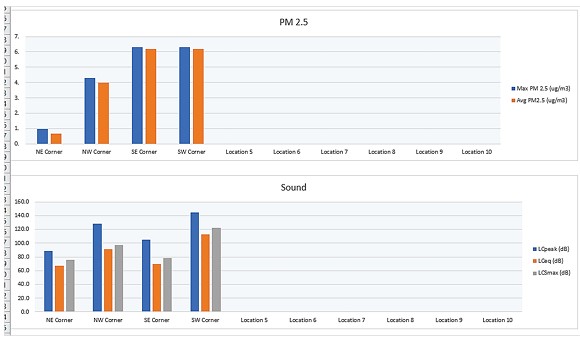The Spatial Analysis Workbook is part of TSI Link™ Report Creator, a comprehensive tool designed to elevate your environmental data analysis by incorporating spatial visualization. This workbook enables users to overlay measurement data onto various images such as building floorplans, equipment diagrams, and maps, providing a clear spatial context for understanding environmental conditions.
The Spatial Analysis Workbook offers a set of worksheets for TSI Link™ Report Creator, enhancing traditional table-based data analysis with spatial visualizations. Users can overlay summary measurement data onto images like building floorplans, hand sketches, photos, and HVAC diagrams. This approach allows for a better understanding of contaminant hotspots, impacts on surrounding areas, and unsafe work zones.
Worksheet Templates

The workbook includes various templates tailored for different types of measurements and instruments:
• General IAQ Assessment: Measures CO, CO2, VOC, PM 2.5, and PM 10 using OmniTrak™ solution and Q-Trak™ XP. Ideal for air quality testing in public spaces, classrooms, labs, and commercial areas.
• General Thermal Assessment: Captures temperature, dew point, wet bulb, rH, and barometric pressure using Q-Trak™ XP and VelociCalc™ meter. Useful for optimizing HVAC systems and assessing energy efficiency.
• PM & Sound Array: Combines PM measurements with sound levels using OmniTrak™ solution, providing insights into air quality and noise in various environments.
• PM & VOC Array: Measures particulate matter and VOC levels, helping determine optimal placements for air purifiers and spot-checking industrial areas.
• Sound Map: Maps sound levels in different settings using OmniTrak™ solution and Casella 620.
Steps for Analysis
1. Select a Worksheet
2. Customize the Cover Sheet: Tailor the cover sheet to fit your specific needs, including configuration of the report.
3. Enter Demographic Information:
4. Load Study Data: Import up to ten studies using the Study Manager or File Import
5. Analyze Data: Review statistical summaries and correlation charts, setting target limits to contextualize results.
6. Complete the Assessment: Add recommendations and conclusions to finalize the report, using spatial visualizations to enhance the presentation.
The TSI Link™ Spatial Analysis Workbook enhances data analysis by integrating spatial context, making it easier to identify and address environmental concerns. Whether you're assessing air quality, thermal comfort, or noise levels, this workbook is an indispensable tool for comprehensive environmental analysis.
For more information, visit TSI Link Spatial Analysis Workbook Guide.
 English
English
 汉语
汉语
 English
English
 Français
Français
 Deutsch
Deutsch

